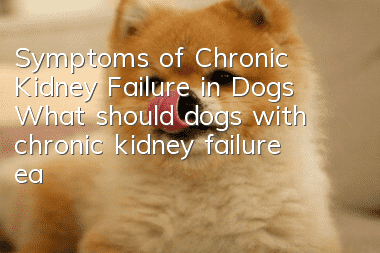Symptoms of Chronic Kidney Failure in Dogs What should dogs with chronic kidney failure eat?

Symptoms of chronic renal failure in dogs
1. Systemic: polydipsia, dehydration, weight loss, malnutrition, lethargy;2. Cardiopulmonary system: systemic arterial hypertension, anemia, heart murmur, Cardiomegaly, arrhythmia, dyspnea, pericarditis, edema;
3. Urinary system: polyuria, nocturia, irregular kidney shape, impaired red blood cell production;
4. Gastrointestinal tract: appetite Decreased appetite, nausea, vomiting, diarrhea, gastrointestinal ulcers, halitosis, uremic stomatitis, constipation;
5. Eyes, skin and coat: skin itching, increased coat loss, pale mucous membranes, retinopathy, sudden Blindness, scleral and conjunctival congestion;
6. Neuromuscular: tremor, gait abnormality, muscle weakness, myoclonus, behavioral abnormalities, cranial nerve defects, epileptic seizures, coma.
Therefore, in daily life, once a dog is found to have the above abnormal symptoms and it is persistent, the dog owner should pay attention to it and send the dog to the hospital for examination and medical treatment in time.
What is chronic renal failure in dogs?
Canine chronic renal failure (CRF) is based on the occurrence of various chronic kidney diseases and slowly develops due to the gradual damage of the nephrons. Decreased renal function leading to irreversible renal failure. The disease mainly manifests as decreased renal function, retention of metabolic waste products (especially nitrogen-containing metabolites after protein decomposition), imbalance of water, electrolytes and acid-base balance, and various endocrine dysfunction related to the kidneys, so that maintenance cannot be maintained Clinical syndrome caused by the stability of the body's internal environment.How to care for dogs with chronic renal failure
1. Daily feeding: switch to high biology High-potency protein prescription food
2. Suppress vomiting
3. Suppress anemia
4. Use antibiotics with caution
5. Avoid stress stimulation
Random articles
- How many days will it take for your dog to recover after cutting to the bleeding line?
- How much should Teddy eat in 2 months? The dog’s food intake should be adjusted every month
- Do dogs have to have their ears and tails cropped? Five questions that even veteran dog owners may not know
- Can dogs eat carrots? Yes, but don’t overfeed!
- Where can dogs swim? You must go to a professional swimming pool!
- What vegetables can dogs eat? It actually doesn’t make much sense for dogs to eat vegetables!
- What diseases are dogs prone to get in autumn? Skin diseases are the most common season!
- How to treat fungal skin diseases in dogs? Just reading the article is enough!
- The dog lay on the lift and fell asleep, thinking he was dead
- Have you found out the root cause of Fa Dou vomiting yellow water?



